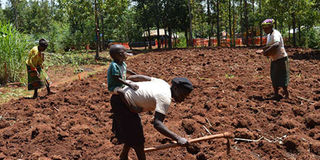Banning animal manure use in growing crops is a load of bull

A family farms at Elukanji village in Kakamega County. The Agriculture ministry intends to ban the use of animal manure in planting crops. PHOTO | FILE | NATION MEDIA GROUP
What you need to know:
- Banning organic fertilisers is certainly not the way to go, especially in a situation where the country suffers acute food deficits.
- Food insecurity in Kenya is a reality we cannot run away from, and we need to seek home-grown solutions instead of following the dictates of well-fed foreign lobbyists.
At first I thought it was a tasteless prank brought on by too much idleness among policymakers in the Agriculture ministry, only to realise that someone was actually serious about banning the use of animal manure to avoid contaminating the soil.
Whoever came up with this gem of an idea to be debated by Parliament contemplates a law that will lead to a comprehensive ban on almost all the cereals, vegetables and legumes consumed by Kenyans, including maize, millet, wheat, beans, peas, sweet potatoes, cassava and other tubers, so long as they are grown using manure.
To be sure, among these proposals are measures intended to make our food exports acceptable in other parts of the world.
But that is only half the story, for it is not quite clear for whom these regulations are meant.
NUTRIENTS
Surely, it cannot be for smallholders, who have no choice but to seek the easiest and cheapest way to fertilise their small pieces of land so that they can attain reasonable harvests on which to subsist.
How can they possibly do it without applying cow, goat, sheep and chicken manure the way they have always done?
Something does not add up here. The proposal has upended all that I thought I knew about subsistence farming.
When I was young, I was taught that manure improves the quality of soil by adding nutrients like nitrogen and other minerals.
It also allows the soil to retain moisture. Now we are being told that we have been doing it all wrong, which does not make much sense, considering that in the past, harvests used to be a lot more bountiful than they are today.
In fact, to coin a phrase, the whole proposal seems to be a load of bull.
FERTILISER
What should small farmers use instead? Even if they could get hold of genuine chemical fertilisers, the prices of those additives are way out of reach for those without any other means of making a living.
Is it possible that they are expected to buy fake fertilisers that have been degrading the soils and making them steadily slip from poverty to absolute destitution?
Could it be a ploy to benefit the crooked brokers who have been importing these counterfeits? Or is it a plot by multinational agribusiness corporations to keep raking in super profits by supplying seeds that cannot regerminate?
Another annoyance is that the Crops (Food Crops) Regulations 2018 contains a plethora of penalties for those who would prevent newly appointed food inspectors to do their jobs.
EXTENSION SERVICES
Apparently, these chaps are supposed to check whether food crops conform to local and international standards.
This is really rich, considering that the once vibrant field extension services offered by the ministry died long ago and there have been few efforts to revive them.
Wouldn’t it make more sense to do so instead of checking how and where farmers are growing their food crops?
It is the government’s duty to empower our farmers to grow enough food to feed on before worrying about the delicate stomachs of fellows abroad who throw away more food each year than grows in the whole of Africa.
FOOD INSECURE
Banning organic fertilisers is certainly not the way to go, especially in a situation where the country suffers acute food deficits that occur whenever the rains are late, inadequate or poorly distributed.
In a situation where people in some regions are starving to death amid mind-numbing denials by the government, this is certainly the wrong time to start placing strictures on how food crops should be grown.
Food insecurity in Kenya is a reality we cannot run away from, and we need to seek home-grown solutions instead of following the dictates of well-fed foreign lobbyists who pretend to know better than our grandparents how to fill our granaries.
Considering that more than 80 per cent of Kenya’s population makes a living from agriculture-related activities, it is time our policymakers rethought their priorities and stopped copy-pasting solutions to food insufficiency from elsewhere.
* * * *
On Friday, I was soundly chastised by my editor for agreeing with three Court of Appeal judges who last week recommended that the age of sexual consent be lowered from 18 to 16 years.
I had penned a long, intense harangue, arguing that the judges were right to make such a proposal because 16-year-olds were having sex with wild abandon anyway, and jailing boys for 15 years for doing something that came naturally was a cruel and unusual punishment.
In retrospect, I am glad to say I was wrong and the editor right for pointing out the errors of my way.
After all, the fact that underage girls were consenting to sex, sometimes with men 10 years their seniors, did not make the crime of defilement any less serious, and lowering the age of consent would merely open the door for paedophiles to prey on vulnerable teenagers.
The best solution is not to lower the age of consent but for parents, teachers and preachers to teach these children all about their bodies and how to protect themselves.
Mr Ngwiri is a consultant editor; [email protected]





